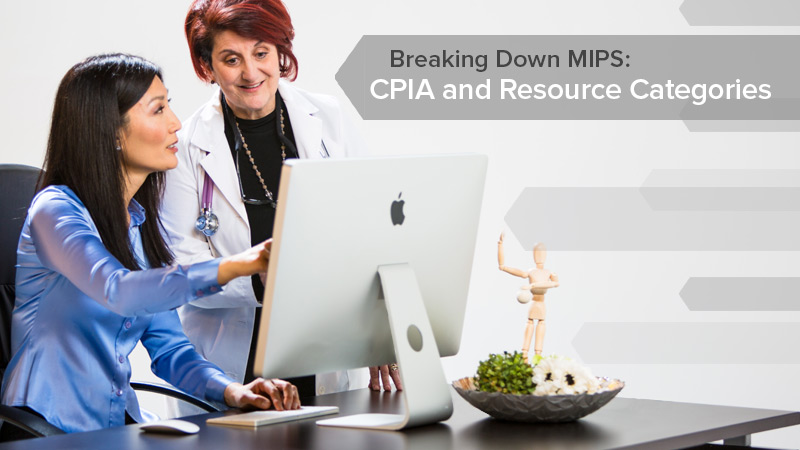
Tick. Tick. Tick. That pesky sound is the clock…more seconds passing until performance year 2017 for MIPS, the merit-based incentive system that transitions our health care system from fee for service to fee for value. There’s about four months to go.
In response, we’re running a MACRA webinar series to inform practices on measures, activities, reporting and data submission standards under MACRA’s Quality Payment Program. In her recent recorded presentation, Debra Harris, Senior Product Manager and Regulatory Specialist here at AdvancedMD, details Clinical Practice Improvement Activities (CPIA) and Resource Use / Cost (VBM), which account for 15% and 10% respectively of total score.
CPIA (Clinical Practice Improvement Activities)
The CPIA performance category does not replace any current program and is a new concept introduced in MIPS.
Harris provides a high-level summary delivering some good news: this may be the first time these activities are required under a national program, but you’ve probably already executed some of these activities. They are categorized as high weight (earning 20 points) or medium weight (10 points), the latter of which are easier to attain.Clinicians participating in a PCMH or Medical Home will receive full credit for the CPIA category and APM participation counts for a half credit or 30 points toward the CPIA category.
Of course, you’ll select activities that best fit your practice from the proposed subcategories:
- expanded practice access
- population management
- beneficiary engagement
- patient safety and practice assessment
- care coordination
- participation in an APM, including a medical home model (half to full credit)
- achieving health equity
- emergency preparedness and response
- integrated behavioral and mental health
The scoring itself is pretty simple: to get the max of 60 points, choose and submit data on a combination of medium/high activities, take the total CPIA points, and divide them by the possible points for CPIA (60) for the percentage score. Harris points out some of the activity definitions are somewhat vague, so it’s best to strive over the minimum to achieve the 60 points—in the ballpark of two to four activities. The proposed rule states the CPIAs must be conducted for a full 90 days during the performance year; however, there is a contradiction here because some activities require 6 months of activity or implementation. This is yet another piece for which we’re waiting on for the final rule for clarity.
The not so good news? There’s some cumbersome reporting ahead. For submission, there is attestation by you saying “yes” or “no” to all 94 activities even though you may be attesting to only 3-6 activities. (We’re just the messengers!). And remember when you attest “yes” to activities, be prepared to report how they are achieved.
Reviewing Resource Use
More good news from the webinar: no submissions are required by you here—all measures are derived by the claims data. Resource use replaces the cost component of the Value Based Payment Modifier program. Adjusted for geography and risk factors, CMS will compare resources used to treat similar care episode based measures and clinical condition groups across practices.
All measures are weighted equally and there’s no minimum measure to get a score. Instead of six measures, it is two of the six measures that they are looking at the total per capita cost for attributed beneficiaries. And new to the Resource Use are 41 episode-based measures, including chronic and acute episodes, combining separate but clinically related services into an episode of care. Most of these measures were included in the 2014 QRURs.
Like quality scoring, points here are decile-based. Review the webinar for some specific examples or reported data.
As the countdown to 2017 continues, keep educated on MIPS. Review our other MACRA webinars here: https://www.advancedmd.com/resources/recorded-webinars. Find—or become!—the MACRA champion in your practice.

